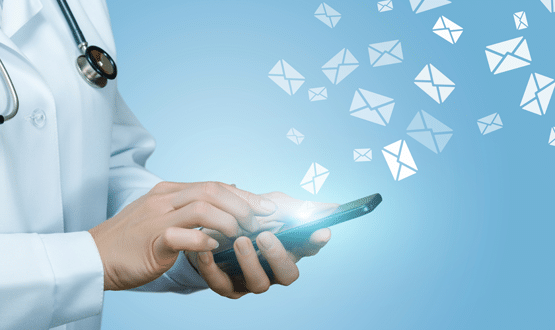Hancock calls for NHS clinicians to be able to email patients directly
- 15 February 2019

Matt Hancock is calling for clinicians to be able to directly email information to patients in a bid to increase data security and reduce delays and wastage.
Speaking at NHS England’s ‘Empowering people in the digital world’ conference on 13 February, the secretary of state for health and social care argued emails are as secure and cheaper than communicating through paper and fax machines.
“There is no reason why a doctor cannot email a patient confidentially, for example with their test results or prescription, rather than make them wait days for a letter or ask them to come into the surgery. The rest of the world runs on email – and the NHS should too.”
A letter lost in the post “could be the difference between life and death”, he argued.
“Having to deal with outdated technology is hugely frustrating for staff and patients alike.”
Having “signalled the end of archaic fax machines in hospitals and GP practices” – a directive from Hancock in December banned the NHS from buying any more machines – he said the next job was “to make it as easy as possible for GPs to communicate safely and securely with their patients and colleagues”.
He added that NHS organisations and GP practices will be able to use any email provider that meets their needs as well as required security settings – not just NHSmail.




28 Comments
From personal experience the biggest problem with emails is that patients expect an immediate response. I, like many clinicians, don’t sit at a desk for more than 20 minutes in any day. Neither do I have a secretary. Where we do have generic emails on NHS.net for external communications, these are accessed once a day by a minimal amount of individuals, and any delay in answering these mails (in the eyes of the sender) leads to numerous phone calls etc. I imagine that GP’s are unlikely to read every email themselves and will have either the receptionists/secretaries screen them and forward only those that require a response from a Doctor.
For the last twenty years I have been puzzled why lawyers, accountants, engineers, priests, scientists, managers in all industries, and even MPs, have been able to adapt their working lives to cope with the benefits that email gives to their clients or customers. But doctors still find objections to giving the same benefits to their customers (patients).
Matt Hancock has to explain all this in words of one syllable.
Having said this, I was delighted that in my stay in hospital earlier this month, the consultant on his ward round was accompanied by two junior doctors pushing laptops on top of trolleys. As a result, on discharge from the ward, I took away an excellent and concise discharge summary with me, outlining the next steps in my treatment. In my previous visits to hospital, the discharge summary would straggle in to my GP two to four weeks after discharge.
So there is IT progress in the NHS. A shame it hasn’t yet hit patient/ clinician communication.
Just now, I am undergoing severe heart and lung problems involving procedures in several hospitais. That I cannot email the hospitals that are treating me, and they are not geared to email me (or each other), slows up my treatment time after time. Telephone is not an alternative, as clinicians do not answer their telephones nowadays. Consultants no longer seem to have secretaries with telephones. Delay is built in to the system. Snail mail is obviously too slow. I long for email, just as an alternative for communicating
The good thing is that, despite the communication and IT failings, the clinical treatment I have received has been superb.
More to come over the next few weeks.
Assuming it takes 10 – 30 minutes to process a single email from a patient (including time to reference notes, speak to colleagues and answer the phone/door for unrelated queries), if just 10 patients emailed me each week I would have to find up to five additional hours a week to answer emails.
I agree sending emails to patients makes good sense. Expecting it to be a routine means of correspondence with a consultant is unrealistic. The ivory tower is more of a little room with a long queue of people waiting their turn.
Ah yes, a little room with a long queue of sick people, who have dragged themselves at death’s door for hours to a surgery full of MRSA. Just like the 19th century. Clearly the doctor’s ideal working environment.
Letters have had a mythology around them that they are secure, this was never true and are more likely to be seen by non involved parties than an email, even email that wasn’t sent encrypted.
Letters lead to problems in patient attendance, so any method of contacting the patient directly removing the worries of demographics not being updated, or letters delayed or lost in the post is a welcome one.
why not simply use protonmail? A fit for prupose secure email with separate encryption for the attachments as well…
Because why is there a need to use a third party when NHS.NET does it already?
Agree Paul. As I’ve said before if the “powers-that-be” want to ensure communications are secure then let Patients whom want to register for NHSMail via their Practice and be given a “nhsnumber@nhs.net” mail address.
Patient’s don’t need an NHS.net account if the sender follows the steps I have outlined previously.
Just tested this for myself Paul and found that effectively I have to download a file which when opened asks me to register my email address for first use. Going to be a lot of people who just say why bother?
Guidance for using emails in health and social care was published in May 2015 by the PRSB (Professional Record Standards Body – membership includes the Royal Colleges, British Computer Soc and others) Download the document from the PRSB here: https://theprsb.org/projects/safe_email/
put [Secure] in the subject of your NHS mail to someone who has a none-secure email address and BINGO you have a secure conversation going on.
Yet again a big policy announcement that already has a solution in place. How many meetings will be had now and at what cost?
Emails are NOT secure! Emails pass through public networks and can be read by all intervening ISPs. A secure web-based messaging system could be used though (maybe with email for patients who opt out of privacy.)
They always opt-out of privacy. Any perceived risk is tiny and the convenience of near real-time, clear text far, far outweighs anything else.
NHS.net CAN send secure emails to none secure recipients.
No need for yet another “solution” when there is one already in place.
About time! Should have been done ages ago. This is the 21st century after all! I’m looking forward communicating directly with my GP instead of being batted about by their administration staff who seem to relish being difficult at times.
Nor is snail mail – many people have access to the mail before it arrives. But take your point. We, as Patients whom request it, could be registered for NHS Mail via our Practice (whom would verify our ID) and our email could be nhsnumber@nhs.net
Yes email is great but where is that conversation recorded? Unfortunately it never makes it into the patient record and is not shared with anyone else
Not easy with web-based email, I agree, but for GPs using Outlook saving relevant emails (not every email needs to be) into the record is straightforward (Save As -> *.txt , then attached into the record)
I have asked for text messages to contact my doctor for blood test results rather than by letter without success. An e mail would be acceptable. Both methods would save the cost of a stamp and delay
Technically easy – create the letter and then email it. Store letter against the EPR.
It’s a historic practice not to have that direct comms but through their secretary who invariably is out of the office or defending her consultant’s busy schedule. Email is an immediate communication – letters via hospital second class post takes up to ten days to arrive! Let’s eliminate the consultant ivory tower and make them more accessible!
That would be great. It took me 8 months to get an appointment last year because the appointment system is simply not fit for purpose. And it often ends up with you being sent to completely the wrong specialist for your problem.
We already have epr.that is a good tool and could be incorporated into email.its vertually allready there.it just needs better implimenting better
They’re already “able to”.
They choose not to (for a variety of reasons).
Exactly so.
I’ve been under three consultants in the past five years. The first was happy to exchange emails with me, the second less so – saying “the Trust” was unhappy for consultants to correspond directly with patients. My current consultant hides behind his med sec and his registrar – he communicates ONLY by letter.
This is obviously a personal preference or a corporate decision.
As an IT professional, I communicate with my NHS clients routinely using their preferred means of secure, encrypted, email.
As an NHS patient, there is no technical reason why I can’t do the same with my consultant.
In this case, I completely agree with Mr Hancock.
I think outbound emails from the hospital is great (save on postage, lost correspondence etc) but this is most likely to be from a “no-reply@nhstrust.nhs.uk” account.
I think the likelihood of being able to get back-forth correspondence with a consultant to be very unlikely. Certainly something I would be unable to cope with in terms of addition to my workload.
Comments are closed.